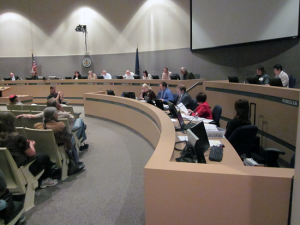“How can you sit there and say that you’re not gonna allow us to testify and give our opinions about how this election is gonna be run. (Hall: We’re gonna have order). How dare you! (Hall: We’re gonna have order in this meeting.) the citizens of your city that you’ve been elected to represent, and you’re gonna shut us out?! (Hall: Security.)”
“In our eagerness to make amends to immediately fix the problems, to respond to public outrage, disappointment and concern, to advance solutions. In our eagerness to do all of these things … we cannot abandon our process. We must not lose sight of our duty to follow the law.”
“Ossiander: I was under the impression that one seal was broken. You found no seals broken? Matthew: In our interviews, in the emails that came in all of that we did not have any report of that. I’m not saying it didn’t happen. Isbell: That’s a lie, that’s a lie – I reported it! I reported it to her! Hall: Order. Security. Isbell: Obviously you threw that away. Matthew: No, (Audience applause) we did not throw that way … but that is hearsay, that was hearsay, it was not a personal chairperson. Isbell: It’s not hearsay. I was there I saw it.”
“If the citizens that made up the commission did something terribly egregious or something terribly corrupt, and it came to your attention you’d be duty bound to say it. But absent extraordinary circumstances, this body would be vulnerable to legal attack by those candidates who properly won the elections and those propositions and bonds and construction projects that properly passed because there is a duty to certify just as there is a duty to order a new election when the time comes.”
Daysha Eaton is a contributor with the Alaska Public Radio Network.
Daysha Eaton holds a B.A. from Evergreen State College, and a M.A. from the University of Southern California. Daysha got her start in radio at Seattle public radio stations, KPLU and KUOW. Before coming to KBBI, she was the News Director at KYUK in Bethel. She has also worked as the Southcentral Reporter for KSKA in Anchorage.
Daysha's work has appeared on NPR's "Morning Edition" and "All Things Considered", PRI's "The World" and "National Native News". She's happy to take assignments, and to get news tips, which are best sent via email.
Daysha became a journalist because she believes in the power of storytelling. Stories connect us and they help us make sense of our world. They shed light on injustice and they comfort us in troubled times. She got into public broadcasting because it seems to fulfill the intention of the 4th Estate and to most effectively apply the freedom of the press granted to us through the Constitution. She feels that public radio has a special way of moving people emotionally through sound, taking them to remote places, introducing them to people they would not otherwise meet and compelling them to think about issues they might ordinarily overlook.





